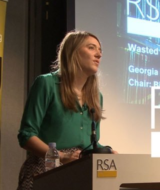Young people are politically active – here’s how Labour can keep up
Young people in Britain today are deeply political – just as likely to volunteer as previous generations, highly engaged in political issues and entrepreneurial about social change. They just aren’t joining political parties or showing many signs of wanting to...
Young people in Britain today are deeply political – just as likely to volunteer as previous generations, highly engaged in political issues and entrepreneurial about social change. They just aren’t joining political parties or showing many signs of wanting to identify with them. In 2011 15.8 per cent of young people supported a political party compared to 57.8 per cent of over-75s.
However, this is by no means unique to political parties. We can see similar patterns in religious organisations, trade unions and many traditional community associations. In 2013 just 9.5 per cent of 20 to 24 year olds were members of trade unions. In 2010 65 per cent of young people between 18 and 24 did not belong to a religion compared to 24 per cent for those over 75. Young people are less likely to engage in formal institutions, full stop.
I’ve lost count of the times a young person said to me: I am not my class, my race, my gender, ‘I am just me’. There is a reluctance to be labelled and a pursuit of personal expression which comes with greater lifestyle choice. The shaping of a personal narrative through work, enterprise or community activism becomes a political journey in itself, so who needs a party?
This is a big challenge for the Labour movement, built as it is on strong collective identities. I remember sitting with a group in the Welsh Valleys whose fathers and grandfathers had a rich tradition of union activism and hearing confusion at the idea of joining a union or even taking collective action: “What happens if everyone turns up, we’re all together and there is only one job available, everyone’s against each other again.”
This doesn’t mean we should give up and go home as politics becomes a battle between independents, or wait for Russell Brand’s revolution. While young people are exercising a silent protest, the whole political system carries on oblivious. The result is that young people and, especially, disadvantaged young people lose out. Research by IPPR found that in the 2010 spending review, 16 to 24 year olds faced cuts to services worth 28 per cent of their annual household income, compared to just 10 per cent for those aged 55 to 74. The infrastructure to support young people is being decimated around the country with over 350 youth centres having closed since 2010.
Changing this story requires those involved in politics to profoundly re-think how we engage with young people. Luckily we are not fishing around in the dark here; there are some brilliant guides to how to do this in young people themselves.
Successful youth movements from Rock the Vote to Citizens UK’s City Safe campaign are optimistic about the potential of young people and they trust them enough to hand over power. They embrace youth leadership, invest in relationships, and give space for personal autonomy within a broader network. They have an open and porous membership but a strong central purpose, and they are transparent about how decisions are made.
Young people don’t have to engage with political leaders as they have been busy creating their own. Take Eliza, who started a movement against gangs around the message of Lives not Knives, or spoken word poet Suli Breaks author of ‘Manifesto for Millennials’, who uses his YouTube platform to spark global conversations about issues important to young people. He is in constant dialogue with his audience, refining and developing his message based on their feedback.
The Labour party could learn from these movements and individuals by embracing structural reform in terms of open primaries and utilising technology to open up how we create policy. In how we govern, it will require a radical devolution of power down to city regions, local government and down again to communities so young people can have a meaningful say over their services. Public services that work for young people are ones where well-trained staff are trusted to innovate and given the time to build meaningful relationships with those they seek to serve. Citizens want much more than just a vote; they should be given the opportunity to take part directly in decision-making in deliberative forums and citizen initiatives. From the young unemployed group in Bradford who asked me why we needed politicians when we could directly vote on issues through social media to the students in Sussex demanding a seat at the table, the message I heard time and time again was – listen to us and trust us.
This will require honest and inspiring political leadership underpinned by policies developed with young people that deal with the urgent crisis facing them in relation to housing, training, employment and fair pay.
The Labour party are well placed to be the party of the young. Generation Y are on the whole more socially liberal than previous generations. They also tend to take a more open, global perspective. In a recent poll of 17 to 22 year olds, 62 per cent thought Britain’s membership of Europe was a good thing. While young people have a strong narrative about personal responsibility, they will support action by the state where they feel it helps those trying to get on. It is a challenge to Labour to prove that reciprocity and fairness sit at the heart of our approach to welfare. These values are most importantly optimistic; the Labour party is at its best when it calls on people’s hopes.
That being said, young people are not going to fall in to line to replace older Labour voters as a loyal band of followers. Their votes will have to be earned time and time again. Outside of electoral politics, young people have competing narratives to explain their disenfranchisement from conspiracy theories through to revolutionary agendas. Anger and alienation is always going to be a breeding ground for system overthrow.
We know that there is growing intergenerational inequality, but layer on top of that rising wealth and income inequality and you are left with a group of young people who are becoming increasingly marginalised in every area of life. We know social mobility is stagnating but research also shows young people bought up in poverty are less likely to engage in formal politics or have a strong sense of community. This is what Professor Mike Savage calls the ‘paradox of class’: as people begin to move away from collective identity and organization, the grip of social stratification on their life chances tightens. Too many young people in Britain are caught up in a churn of unemployment and low-paid work with little opportunity for progression, yet if you subscribe to an ideology of personal responsibility then the only person you feel is to blame is yourself. We see in young people the proliferation of mental health issues, depression and isolation.
It is time to recognise that the current social contract has broken down and work with young people to build a new one. Young people don’t just want a job, they want the opportunity for creativity, entrepreneurialism and to be part of something bigger than themselves. The big challenge for Labour is to hold as many aspirations for young people as they do for themselves. Young people and especially disadvantaged young people desperately need the Labour party to take up their cause. But to do so we have to meet them where they are, not where we would like them to be.
Georgia Gould is a Labour councillor in Camden and author of Wasted: How misunderstanding young Britain threatens our future (Little, Brown)
This article originally appeared in the Spring 2015 edition of the Fabian Review.

